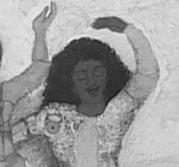| Timbrels and Torah | |
|---|---|
 | |
| Directed by |
|
| Written by |
|
| Produced by |
|
Release date |
|
Running time | 36 min. |
| Country | United States |
| Language | English |
This article relies largely or entirely on a single source .(December 2024) |
Timbrels and Torahs is a 2000 American documentary film written, produced and directed by Judith Montell and Miriam Chaya. The film explains a new Jewish ritual designed to celebrate women on their 60th birthday. [1]